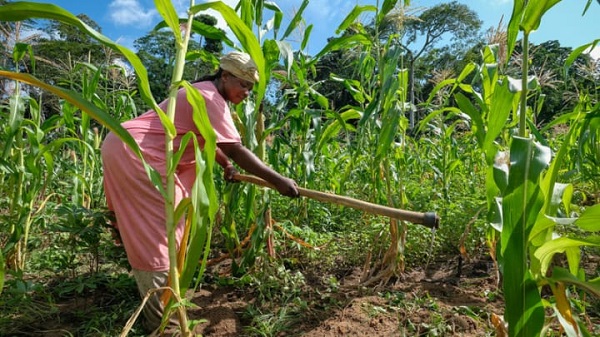Farmers under SSPiNG project produce 61,878 metric tonnes of soyabeans
The Sustainable Soyabean Production in Northern Ghana (SSPiNG) project, has contributed to increase soyabean production in the country as farmers under the project produced 61,878 metric tonnes of soyabeans during the farming season in 2022.
Professor Samuel Adjei-Nsiah, Coordinator of SSPiNG, who announced this, said “Some of the farmers got about 800 kilogrammes (kg) to 1,200 kg per acre, which is between eight to 12 bags per acre.
“On the average, majority of them were getting an average of six bags per acre, which is very good. Previously, they were getting three to four bags per acre.”
He added that “As a result of that they have been able to increase their profit margins. It has improved their livelihoods. Those, who were able to harvest early, and thresh and sell, got very good prices. At that time, the grains were being sold at GHc650 per 100 kg.”
Professor Adjei-Nsiah, who attributed the situation to activities implemented under the project last year, was making a presentation at a meeting to review activities implemented under the project in 2022, and come out with strategies to improve moving forward.
The two-day meeting, held in Tamale, was attended by various stakeholders including staff of the project and Yara Ghana, farmers, aggregators, representative of the Norwegian Agency for Development Cooperation, representatives of the Departments of Agriculture from the districts benefiting from the project as well other value chain actors.
The SSPiNG project seeks to sustainably increase the production of soyabean to meet the rising demand in the country as well as enable rural households to raise their incomes and improve food security on a sustainable basis.
It is being implemented by the International Institute of Tropical Agriculture (IITA) and Yara Ghana in partnership with the Ministry of Food and Agriculture, Wageningen University and Research and Felleskjøpet Rogaland Agder and it is funded by the Norwegian Agency for Development Cooperation.
The beneficiary districts include Yendi, Saboba, Karaga, Savelugu, Nanton, Gushiegu, West Mamprusi and East Mamprusi, Bawku Municipal, Bawku West, Binduri, Wa East, Sisala West, Sisala East, West Gonja and East Gonja.
Professor Adjei-Nsiah mentioned some of the activities implemented under the project in 2022, which included facilitating public private partnerships around capacity building, access to input and output market, finances and mechanisation, building the capacity of aggregators, nucleus farmers and some commercial farmers, introducing good agronomic practices to farmers, developing training manuals to train partner extension agents amongst others.
He said about 24,000 farmers in the districts benefited from the activities.
He added that the project supported some nucleus farmers and aggregators to acquire 15 threshers to help in threshing soyabeans produced to ensure good quality grains and to reduce the drudgery and workload on women who are the people that generally do the manual threshing of soyabeans.
He explained that “One of the difficult tasks is threshing. Normally, farmers will thresh the soyabean by hitting the pods on the ground, and most often, the grains are mixed with dirt, stones, debris and other foreign materials, which tend to reduce the quality of the grains produced. To overcome this challenge, we supported the nucleus farmers and aggregators with grants to enable them to procure mechanised threshers to use to thresh the soyabean produced by the smallholder farmers especially the women farmers.”
Dr Richard Asare, Country Representative of IITA – Ghana said the project was on course adding “We are at the level that we are going to break grounds for soyabean in the country.”
Mr Kudjoe Agbenyega, Acting Managing Director of Yara Ghana, said the project had led to improved knowledge on soyabean production, which was good for increased production.
Jessica Nyman, Senior Advisor at Norwegian Agency for Development Cooperation, said she was impressed with the work undertaken under the project so far, adding, the increased yields would have effect on the livelihoods of smallholder farmers.
She expressed the need for project partners to discuss strategies to further improve women’s access to mechanisation services to speed up the planting process of the grain.



